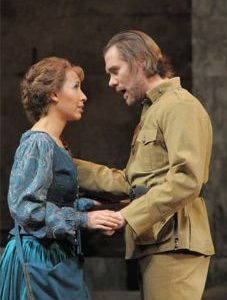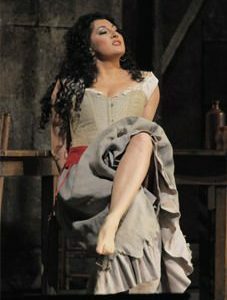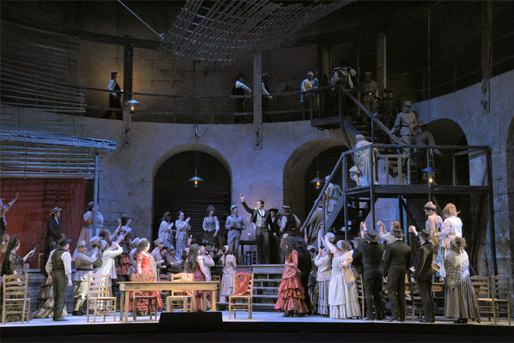Carmen – March

Carmen
Composed by Georges Bizet
Libretto by Henri Meilhac and Ludovic Halévy
Based on the novella by Prosper Mérimée
Conductor Alain Altinoglu
Stage Director Harry Silverstein
For all men kill the thing they love . . . .
– Oscar Wilde
When Georges Bizet’s final opera opened at the Opéra Comique in Paris in 1875, it was a scandal: the sensuality and violence of the piece were unheard of for the venue, which up to that point produced almost exclusively family-friendly material. Even though it flopped in Paris, upon its arrival in Vienna it was heralded as genius: being wholly un-Wagnerian, it did not invite comparisons to the German-speaking world’s operatic titan, and so could flourish on its own account. It soon spread like fashion throughout Europe, in each city hailed a triumph; but Bizet never saw its success, having died only 13 performances into the debut.
The story revolves around a Spanish gypsy (the eponymous Carmen, played masterfully by Nadia Krasteva) and the man she takes as a lover, a Spanish corporal, Don José (Brandon Jovanovich, in an outstanding performance). He is an upright but flawed man, with a mother and would-be fiancée in his home village; quick to temper and impulsive, when he shirks the advances of the beautiful gypsy, she finds him irresistible and throws a rose at him, striking him between the eyes. Having ensorcelled him, Carmen convinces Don José to go to prison in her stead; upon his release, he finds her, and she wants to run away together. They do, after a confrontation with Don José’s commanding officer (Craig Irvin) results in his forced desertion. While traveling in their band of smugglers, a famous toreador finds them, and convinces Carmen to leave the corporal for him. Don José, learning of his mother’s ailing health, begrudgingly leaves, swearing to find Carmen once again. He finds her in a procession entering the Seville bullring, and, when she refuses to come back to him, he kills her.

The raw passion and sensuality on display – and the realistic portrayal thereof, which helped fuel the verisimo movement in opera – might have upset Carmen’s first audience, but it is one of the reasons this piece not only endures but is ranked among the world’s greatest and most oft-performed operas. The emotions of Bizet’s characters are very natural: much more natural than the idealized, ossified, ideologically conservative emotions employed by Wagner. Not only the sensuality, sensibility, and joy, but, “finally, love—love translated back into nature. Not the love of a ‘higher virgin’! No Senta-sentimentality! But love as fatum, as fatality, cynical, innocent, cruel—and precisely in this a piece of nature.” It is this representation of love that Nietzsche found so realistic in this play. He describes the love of Carmen precisely in that passage. He also believed that Bizet understood the emotion better than most other artists – than most other people: “They believe one becomes selfless in love because one desires the advantage of another human being, often against one’s own advantage. But in return for that they want to possess the other person.” Don José, undeniably, is the embodiment of that love. Indeed, of all love – for every one of us knows that possessiveness, to one degree or another.
This conception of love is one reason Nietzsche posited Carmen as a sort of anti-Wagner: there is no conservatism behind it, no regressivism; it does not preach to the audience – there is no “ought,” Carmen does not tell its viewers to go home and change their lives, to affix themselves to a canonized account of what the composer believes should be so. It does not say, “You ought to behave in such-and-such a way, because I tell you to.” It is philosophical eo ipso, making an argument with the piece itself; trusting the audience, rather than telling them. (“This music treats the listener as intelligent, as if himself a musician—and is in this respect, too, the counterpart of Wagner, who was, whatever else he was, at any rate the most impolite genius in the world (Wagner treats us as if——he says something so often—till one despairs—till one believes it),” Nietzsche wrote about the two composers.) Bizet’s opera also focuses not on great men, but on the people – indeed, on rapscallions. The population of Bizet’s work is not full of paragons of virtue and harbingers of evil, but of normal people living and trying to survive. Instead of walking over the common man, telling him to behave as the composer wishes, Bizet makes the common man his subject – and thus makes his work much more democratic than Wagner’s would ever want to be.
Bizet’s Carmen is also a great affirmation of life: even in the opening scene, he celebrates it. Don José’s girl, Micaëla (played by the superb Nicole Cabell), enters the Seville scene to look for him at his outpost, but finds only soldiers determined to gaze at the pretty girl as long as they may: there is sex. Suddenly, as one set of officers is relieved of duty, a bustle of street urchins, all children (in this case the Chicago Children’s Choir – just wonderful) pretend to be the guards themselves, singing Avec la garde montante . . . : there are children, the result of sex. The scene simply bursts with life. It is brimful. The entire opera is a celebration of life: it overflows with exuberance. Bizet, according to Nietzsche, also takes inspiration from a Mediterranean sense of joy: “Fate hangs over it; its happiness is brief, sudden, without pardon.”

And at the center of this is the gypsy prostitute Carmen. Some people see her as evil – both Micaëla and Don José compare her with Satan, and audiences sometimes agree – but they fail to see the purity and innocence that she embodies. She is Dionysian: she is primal; she sings; she longs for freedom; as Thomas Mann once described the Dionysian, “she gives deeper joy, she consumes more quickly.” Is that not, exactly, the cost of her love? And is she not honest, indefinitely honest, about this? In her first song, the famous Habanera L’amour est un oiseau rebelle, she tells the guards to beware if she loves them. Does she ever promise Don José that she’ll be with him with him forever? As the toreador Escamillo (Kyle Ketelsen in a stand-out performance) tells Don José, her affairs seem to last only six months. But that is because her passions are so much more intense than a normal person’s that no one is able to endure. She elevates the passions of the men she seduces, but none are able to sustain her: she is too alive, to overfull, for them to match her. It is only Don José that she is able to raise to her level of passion – and because he is not like her, because he is only human, all-too-human, he is driven mad by this excess of passion, so out of necessity, out of self-preservation, he kills her. Moreover, she cannot survive in a world in which no one is as alive as she is. Her passions are too strong for society, and so society’s rules do not apply to her. She is, perhaps, a revaluator of values – she may be a kind of overman. Certainly she does not let society ever get in the way of her freedom. She is going to prison, she convinces Don José to let her escape; she is fired at the cigarette factory, she finds another job; she is becoming ensnared by one lover, she leaves and finds another. And once she predicts her own death, she refuses to be controlled by it, facing Don José, telling him she is not afraid of dying by his hand; which, indeed, she does – and is perhaps given the ultimate freedom. For when dead, society will never be able to entrap her.
It is clear, with a piece as rich as this, why Carmen has endured. And the Lyric puts on a stellar production, with everything you could ask for: every single performer is impeccable; the musicians and conductor are top-notch; the sets, costumes, and other technical aspects are all magnificent. A very traditional, and very talented, production of one of the great operas, it would be foolhardy to let this one pass by unnoticed.
Highly Recommended
Will Fink
Reviewed on 3.15.11
For full show information, go to the Carmen page at Theatre in Chicago.

